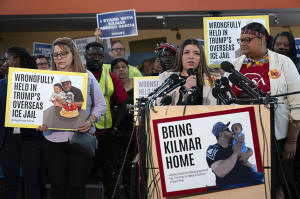US still won't say whether it will return mistakenly deported man,
despite Supreme Court decision
[April 14, 2025]
By BILL BARROW
The Trump administration is doubling down on its decision not to tell a
federal court whether it has any plans to repatriate a Maryland man who
was mistakenly deported last month and remains confined in a notorious
prison in El Salvador, despite a Supreme Court ruling and lower court
order that the man should be returned to the United States. The U.S.
district court judge handling the case of Kilmar Abrego Garcia now is
weighing whether to grant a request from the man's legal team to compel
the government to explain why it should not be held in contempt. Any
move toward a contempt finding would represent an extraordinary turn in
the Trump administration's assertion of presidential authority, both
generally and specifically over immigration policy.
The government's latest daily status update, filed Sunday as required by
Judge Paula Xinis, states essentially that the Trump administration has
nothing to add beyond its Saturday statement that, for the first time,
confirmed that Abrego Garcia, 29, was alive and remained in an El
Salvador prison under the control of that country's government. That
means for the second consecutive day, the administration has not
addressed Xinis' demands that the administration detail what steps it
was taking to return Abrego Garcia to the United States.
The U.S. Supreme Court ruled last Thursday that the Trump administration
must bring him back. Xinis followed that with an order Friday requiring
the administration to disclose Abrego Garcia’s “current physical
location and custodial status” and “what steps, if any, Defendants have
taken (and) will take, and when, to facilitate” his return.
The Trump administration has asserted that Abrego Garcia, who lived in
the U.S. for about 14 years before being deported, is a member of the
MS-13 gang. Abrego Garcia has disputed that claim, and he has never been
charged with any crime related to such activity. The Trump
administration has called his deportation a mistake but also has argued,
essentially, that its conclusion about Abrego Garcia's affiliation makes
him ineligible for protection from the courts.

Abrego Garcia's location was first confirmed to the court by Michael G.
Kozak, who identified himself in the Saturday filing as a “Senior Bureau
Official” in the State Department's Bureau of Western Hemisphere
Affairs. Sunday's status update was signed by Evan C. Katz, who was
identified in the filing as assistant director of Enforcement and
Removal Operations for the U.S. Immigration and Customs Enforcement
agency within the Department of Homeland Security.
Separately, Abrego Garcia's lawyers have asked Xinis to issue an order
compelling the government to explain to the court why it should not be
held in contempt for failing to comply fully with previous orders. As of
early Sunday evening, Xinis had not filed such an order.

[to top of second column]
|

Jennifer Vasquez Sura, the wife of Kilmar Abrego Garcia of Maryland,
who was mistakenly deported to El Salvador, speaks during a news
conference at CASA's Multicultural Center in Hyattsville, Md., April
4, 2025. (AP Photo/Jose Luis Magana, file)

Abrego Garcia's lawyers also have asked Xinis to order the
government, among other things, to produce documents and contracts
that detail the U.S. agreement with El Salvador to house people
deported from the U.S. or, in absence of such records, to require
that government officials testify in court about the arrangement.
Xinis expressed frustration Friday during a hearing in her Maryland
courtroom when a U.S. government attorney struggled to provide any
information about Abrego Garcia’s whereabouts.
“Where is he and under whose authority?” the judge asked during the
hearing. “I’m not asking for state secrets. All I know is that he’s
not here. The government was prohibited from sending him to El
Salvador, and now I’m asking a very simple question: Where is he?”
The judge repeatedly asked a government attorney about what has been
done to return Abrego Garcia, asking pointedly: “Have they done
anything?”
Drew Ensign, a deputy assistant attorney general, told Xinis that he
had no personal knowledge about any actions or plans to return
Abrego Garcia. But he told the judge the government was “actively
considering what could be done” and said that Abrego Garcia’s case
involved three Cabinet agencies and significant coordination.
Kozak's statement a day later stated: “It is my understanding based
on official reporting from our Embassy in San Salvador that Abrego
Garcia is currently being held in the Terrorism Confinement Center
in El Salvador. He is alive and secure in that facility. He is
detained pursuant to the sovereign, domestic authority of El
Salvador.”
The Justice Department has not responded to an Associated Press
request for comment.
During his time in the U.S., Abrego Garcia worked construction, got
married and was raising three children with disabilities, according
to court records.
A U.S. immigration judge initially shielded Abrego Garcia from
deportation to El Salvador because he likely faced persecution there
by local gangs that terrorized his family. The Trump administration
deported him there last month anyway, before describing the mistake
as “an administrative error” but standing by its claims that he was
in MS-13.
All contents © copyright 2025 Associated Press. All rights reserved |